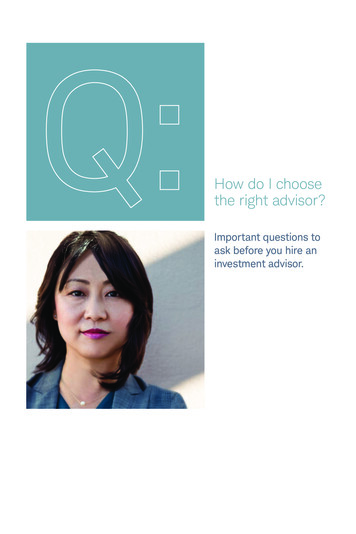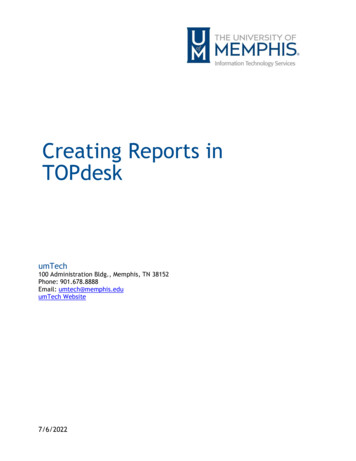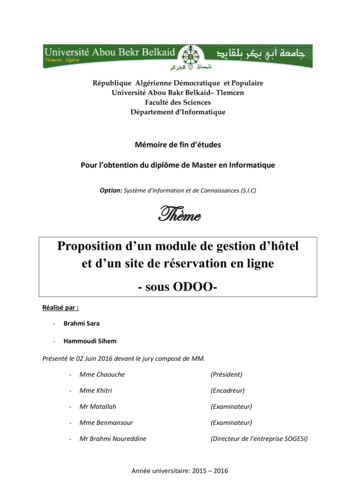
Transcription
How do I choosethe right advisor?Important questions toask before you hire aninvestment advisor.
To choose an advisor you feelcomfortable with—both personallyand professionally—it’s smart to takeyour time, talk face-to-face, and askthe right questions.
Are you looking for your first investment advisor?Or do you feel that your current advisor no longer meetsyour needs? This booklet can help you ask the rightquestions to make an informed choice.Questions to Ask YourselfWhat are my choices? . . . . . . . . . . . . . . . . . . . . . . . . . . . . . . . . . . . . . 3Where do I start? . . . . . . . . . . . . . . . . . . . . . . . . . . . . . . . . . . . . . . . . . 4Questions to Ask AdvisorsWhat are your credentials? . . . . . . . . . . . . . . . . . . . . . . . . . . . . . . . . . . . 7Do you offer the services I need? . . . . . . . . . . . . . . . . . . . . . . . . . . . . . . . 8How are you compensated? . . . . . . . . . . . . . . . . . . . . . . . . . . . . . . . . . 10How will we work together? . . . . . . . . . . . . . . . . . . . . . . . . . . . . . . . . . 11How do you approach investing for people like me? . . . . . . . . . . . . . . . . . . . . 12Where will my assets be held? . . . . . . . . . . . . . . . . . . . . . . . . . . . . . . 13My NotesUse these pages to prepare for advisor conversations . . . . . . . . . . . . . . . . . . . . 141
Questions to Ask YourselfBeing able to clearly articulate your needs andexpectations will help you and the advisors you talk withmake an informed decision about whether you’re right foreach other.Suggestion: List the reasons you’re looking for an advisor inMy Notes on page 15.2
What are my choices?When you’re choosing an advisor, trust is essential. Youcan find advisors in a variety of places—in a largerfinancial firm such as a brokerage house or bank, or inan independent advisory firm. This brochure is designedto help you learn about and select an independentfinancial advisor, but can also be used more broadly toselect an advisor in general.*Why an independent financial advisor may be a good choice for youThey’re independentIndependent advisors generally have affiliations with a varietyof firms that assist with tax planning, estate planning, moneymanagement, and more. These affiliations allow them to help theirclients with complex financial needs.They’re usuallyIndependent advisors often charge fees based on a percentage offee-basedyour assets—so growing your portfolio benefits you both.Your assets areIndependent advisors typically manage your assets in an accountgenerally held bythey open for you with a third-party custodian—a bank ora third partybrokerage firm. The account is in your name, and the custodian sends youaccount statements that detail all the transactions your advisorhas made for you. You may pay the custodian for its services separately from whatyou pay your advisor.* This brochure is not intended as a recommendation or endorsement of any specific advisor. You must decide whether tohire an advisor, what authority to give the advisor, and what type of advisor is right for you.3
Where do I start?Whether you’re starting with a list of recommendedadvisors or you have a specific advisor in mind, thefollowing three steps can help you make a thoughtfulchoice.1Start with a preliminary screening.You can review pertinent information about an advisor evenbefore you meet. Most independent financial advisors arerequired to publicly disclose details about their business byfiling a Form ADV. You can review the Form ADV on the SECwebsite for federally registered independent financial advisorsat www.adviserinfo.sec.gov. Form ADV, Part 1 describes an advisor’s advisory services,compensation, disciplinary history, and other aspects of itsbusiness operations. Form ADV, Part 2 describes an advisor’s services, fees, andinvestment strategies. Advisors are required to give you Part 2information before you hire them.Keep in mind that not all investment advisors are registered.State-registered financial advisors may not file a Form ADV,and advisors that are exempt reporting firms only completeparts of Form ADV.Things to check on Form ADV:*Type of businessAssets under managementAffiliations with other financial services companiesServices offeredDisciplinary history4*Other information is available on Form ADV. This list is not all-inclusive.
23Know your investment objectives.Identifying your objectives will help you select anPrepare tointerview advisors.advisor who is in tune with your ultimate goals andAs you begin to talk withpersonal preferences. Advisors will want to know:advisors, you’ll want toYour investment goals—What are you working toward:A comfortable retirement? Leaving a legacy?Philanthropic goals?evaluate them objectively.Asking each advisor aconsistent set of questionswill help ensure that youRisk tolerance—How much fluctuation in value canhave the information youyou tolerate in exchange for the opportunity to earnneed to make a goodabove-average returns?comparison.Time horizon—When will you need to withdrawmoney from your investments?Income needs—Do you need current income fromyour portfolio? How much?Suggested questionsstart on the next page ofthis booklet.Tax situation—Does your tax bracket require atax-sensitive strategy?Other holdings—Do you have significant wealth tiedup in real estate or other illiquid assets?Other needs—Do you have complex planning needsrelated to wealth transfer, executive compensation,risk management, business succession planning, orphilanthropic planning?Suggestion: Jot down your objectives in My Notes on page 16.5
Questions to Ask AdvisorsAn advisor you’ll be comfortable working with is one whowelcomes your questions and gives you answers you canunderstand.If you don’t understand something, ask, ask, and ask again.6
What are your credentials?An advisor’s professional designations can tell you a greatdeal about his or her education and areas of expertise.Common Credentials*CFP (CERTIFIED FINANCIAL PLANNER )CFPs have completed university-level financial planning coursework andpassed a 10-hour exam covering nearly 90 topics, from group medicalinsurance to derivatives.More information: www.cfp.netCFA (Chartered Financial Analyst )CFAs must pass three exams, each of which demands a minimum of 250 hoursof study and includes corporate finance and financial statements.More information: www.cfainstitute.orgPFS (Personal Financial Specialist)PFSs are certified public accountants who specialize in personal financial planning.The credential requires a detailed exam and significant financial planning expertise.More information: www.aicpa.orgCIMA (Certified Investment Management AnalystSM)CIMAs focus on asset allocation and typically complete final coursework atthe Haas School of Business at the University of California, Berkeley, or at theUniversity of Pennsylvania’s Wharton School of Business.More information: www.imca.org* Not a complete list of certifications. There is no implied endorsement of one certification over another.Suggestion: Visit the website of the organization that issued an advisor’s credential toverify that the advisor is a member in good standing.7
Do you offer the services I need?Investment advisory practices vary widely in theservices they provide. In general, they fall into one or acombination of the categories listed below.Money managersFinancial plannersIf you need someone to manage yourIf you need someone to reviewportfolio and do your investing, consideryour situation and help with big-money managers. They:picture planning, consider financialDesign investment portfolios, generallyconsisting of stocks, bonds, and otherHelp you look to the future and doindividual securities.long-term financial planning in the areasOften manage the portfolio on aof retirement, college funding, wealthdiscretionary basis, meaning that youtransfer, tax planning, and insurance.authorize the advisor to trade on yourMay not offer investing and portfoliobehalf without the need for advancemanagement services.approval from you.May not offer general financialplanning services.8planners. They:
Wealth managersIf you need an advisor who can handle bothyour investing and planning needs, considerwealth managers. They:Provide highly personalized,comprehensive financial planning as wellas investment and portfolio managementfor high-net-worth clients.Services I need from an advisor:InvestingPortfolio analysisPortfolio designDiscretionary portfolio managementOngoing investment adviceCash managementCoordinate with other professionalBudgetingadvisors, such as attorneys andRetirement incomeaccountants, to serve more complexfinancial needs, which may includePlanningtax minimization, trust management,Retirementwealth transfers, real estateEducation fundingmanagement, portfolio performanceBusiness successionanalytics, and more.Charitable givingPersonal and business lendingWealth transfersTrusts and estate plansInsurance review9
How are you compensated?Knowing how your advisor is compensated may help youevaluate the relative objectivity of the recommendationsyou receive. Independent financial advisors generallywork on a fee-only or fee-plus-commissions basis.Types of compensation and what they mean to you:Fee onlyAsset-based, hourly, or flat fees: Many independent financial advisors charge apercentage of the assets they manage for you (typically 1%–2%). This compensationmethod rewards your advisor for growing your portfolio. Hourly or flat fees are oftenassociated with a specific, one-time service (e.g., developing a financial plan). Thefee may vary by account size and service. In addition to these fees, you may pay otherfees for execution of the trades your advisor makes and for custody of your assets.Fee plus commissionsAlong with an advisory or financial planning fee, some advisors may receive aportion of the commissions you pay when you buy or sell certain financial productsthat the advisor recommends, such as insurance policies or annuities.Commissions onlyAdvisors sometimes receive only compensation from sales commissions on theinvestments they buy and sell for you. This method may give the advisor an incentiveto recommend that you buy and sell more often.Wrap feesSometimes advisors charge a “wrap fee,” which is typically a single asset-based feefor both the advice they provide and the execution of the trades they make.10
How will we work together?Good communication between you and your advisor isessential. Asking the questions below can help youjudge the amount of attention and regularcommunication you can expect.What to ask:Who will I work with?In some cases, the firm’s principal may conduct your initial meeting, and then turn yourportfolio over to an associate or a team who actually manages it. If personal rapport isimportant to you, ask to meet personally with the people you’ll be working with.How often will we communicate?Regular contact helps ensure that you and your advisor are clear about your financialgoals, risk tolerance, and investment strategy. Typically your advisor meets you inperson at least annually—and stays in touch more frequently by phone and email.How will you report performance?At a minimum, you should expect to receive: Account statements from the advisor or custodian/brokerage firm where yourassets are held Quarterly summaries of year-to-date investment performance A comprehensive annual performance report from your advisorWhat is the size of your firm?A firm’s size—including the number of employees, assets under management, and theaverage portfolio size—can have a bearing on the quality of service you receive. Large firms may have more resources—an important consideration if your needscall for specialized services. Small firms may offer more personalized attention. The average portfolio size of the advisor’s other clients helps you understand yourpotential fit with the firm.11
How do you approach investing forpeople like me?Before discussing investments, an advisor should get toknow you, your financial issues, and your goals for todayand the future. This will allow the advisor to giveinvestment advice that’s rooted in a deep understandingof what you want to achieve and that can be tailored toyour specific needs.Performance Ask to see portfolio performance numbers for up and down markets. Ask the advisor to compare the performance with relevantbenchmarks, such as the S&P 500 , during the same time period. An advisor should at least meet—and preferably beat—the benchmark.Investment style Advisors may specialize in certain types of investments (such as mutual funds,stocks, or bonds) and styles (such as growth or value). You can assess whether the advisor’s methodology or style aligns withyour objectives. Asking about an advisor’s investment style is a good way to make sure that theadvisor can explain his or her approach clearly and in a way that you understand.Decision-making Advisors who have a disciplined approach to decision-making may be more likelyto stay focused on your long-term goals. Many advisors use an asset allocation strategy that has a history of success overtime. Your strategy should be based on your goals, time horizon, and comfortwith risk. Knowing how often an advisor adjusts portfolios can indicate whether the advisoruses a strategic, long-term approach or invests in short-term trends.12
Where will my assets be held?Independent financial advisors typically useindependent custodians—generally brokerage firms orbanks—to hold and safeguard their clients’ stocks,mutual funds, and other assets.Why should you ask this question?You want to be confident that your advisor has chosen a custodian that meets or exceedsthe security measures required by industry regulators to protect your assets. Look for a custodian with important services like trade execution andpreparation of monthly brokerage statements, which will allow your advisorto concentrate on managing your portfolio. Ask about the custodian’s policies to protect both personal and financial informationfrom unauthorized activity.We hope this guide will help youchoose an advisor who is right for you.You can find more information aboutchoosing advisors on these websites.Professional designations and whatthey mean:www.finra.orgProtection for brokerage accounts:www.sipc.orgAccess to Form ADV for independentfinancial advisors:www.adviserinfo.sec.gov13
[ My Notes ]As you begin your search for an investment advisor, you may find it helpful to jotdown your thoughts and comments on these pages. Keeping everything in oneplace—including notes about your own needs and goals and the questions youwant to ask—can help make your search more productive.14
[ My Notes ]Why I’m looking for an advisorSharing your reasons can give advisors a better understanding of your priorities.If you’re currently investing on your own:My portfolio has grown too complex for me to comfortably manage.My portfolio is not meeting my performance goals.I want someone else to do the day-to-day investing.I’d rather be spending my time on other things.I need help with a plan that addresses my entire financial picture.I need help with a windfall, such as money from a home sale.I’m retiring and want to create a reliable income stream.I want help with tax-efficient investing or developing an estate plan.If you’re already working with an advisor:My portfolio has outgrown my advisor’s expertise.I question the advice I’m currently receiving.The advice I receive doesn’t reflect my goals, situation, life stage, or risk tolerance.My advisor doesn’t seem to be listening to me.Other reasons:15
[ My Notes ]My investing objectivesTo help an advisor understand your current situation and goals, you may find it helpful tojot down your thoughts before meeting.My investment goals—What am I working toward: A comfortable retirement? Leavinga legacy? Funding college?My comfort with investment risk—How much fluctuation in value can I tolerate inexchange for the opportunity to earn above-average returns?My time horizon—When will I need to withdraw money from my investments?My income needs—Do I need current income from my portfolio? How much?16
[ My Notes ]My tax situation—Does my tax bracket require an investing strategy thatminimizes taxes?Other holdings—Do I have significant wealth tied up in real estate or otherilliquid assets?Other needs—Do I have complex planning needs related to wealth transfer,executive compensation, risk management, business succession planning, orphilanthropic planning?Not sure about yourobjectives?“I don’t know” is aperfectly fine answer.Advisors often begin byhelping you articulateyour objectives.1717
[ My Notes ]QualificationsProfessional credentials?Education?Years of experience?18
[ My Notes ]ServicesInvestingPortfolio analysisPortfolio designPortfolio managementOngoing adviceCash managementBudgetingRetirement incomePlanningRetirementEducation fundingBusiness successionCharitable givingPersonal andbusiness lendingWealth transfersTrusts and estatesInsurance reviewCompensationFee only?Fee and commissions?Commissions only?Wrap fees?19
[ My Notes ]PerformanceInvesting style?Decision-making?Results?RelationshipPrimary contact?Number of clients served?Average assets per client?Communication frequency?20
[ My Notes ]CustodyAssets in my name?Independent custodian?Name of custodian?Learn more about thebenefits of working withan independent advisor.FindYourIndependentAdvisor.com21
This content is made available and managed by Charles Schwab & Co.,Inc. (“Schwab”). The purpose of this information is to educate investorsabout working with an independent Registered Investment Advisor (RIA).The RIAs and their representatives use Schwab for custody, trading,and operational support. Many independent RIAs and other financialservices professionals receive compensation for services in a varietyof ways. Registration does not imply a certain level of skill or training.It is the responsibility of each investor to determine which method ofcompensation offers the lowest total costs and best serves the interestsand needs of the investor.The S&P 500 Index is an index of widely traded stocks. Indexes areunmanaged, do not incur fees or expenses, and cannot be investedin directly. 2016 Charles Schwab & Co., Inc. All rights reserved. Member SIPC.CC0511789 (0516-FDVC) MKT91806-00 (06/16)00166487
Form ADV, Part 2 describes an advisor's services, fees, and investment strategies. Advisors are required to give you Part 2 information before you hire them. Keep in mind that not all investment advisors are registered. State-registered financial advisors may not file a Form ADV, and advisors that are exempt reporting firms only complete











